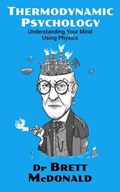If humans behave based on logic, values, and a desire for good things, then why do we sometimes act so destructively? Why do we feel good about ourselves one day, and bad about ourselves the next? Why are we so driven toward self-sacrifice and service to others? To solve these mysteries and more, we must understand that the mind is a machine, operating under the laws of physics.
In THERMODYNAMIC PSYCHOLOGY, Dr. Brett McDonald will give you a blueprint of this engine, and demonstrate how it works. You'll gain a new perspective on familiar topics like:
Human needs: The purpose of the mind machine, approached from a "why" rather than "what" angle
Identity and self-concept: Shaped by energy flows, by the buildup of constructive, destructive, or absent workflows in our various categories of need
Relationships: Operating as open energy systems, relationships are an ongoing current of energy between ourselves and other people
Sleep/wake phases: As part of a four-stroke combustion cycle, we sleep because our systems are exhausting waste
Consciousness and dreams: The conversion of energy into work determines our level of consciousness. During sleep we dream, and lose our sense of identity and orientation, because only a very small amount of work is being generated
Choice: When we fulfill our needs, we create light gravity, which makes us want to do healthy and positive things. But when our needs are damaged or neglected, we create dark gravity, which pulls us toward destructive and unhealthy behaviors
Time: Thermodynamics explains why time heals all wounds, and makes it so our needs never stay fulfilled
Free will: We have free will, but our choices are also steered by forces of physics
Motivation: Generated by energy, gradients, and action potentials
Thermodynamic Psychology makes the mind much more predictable, which is the first step toward making it controllable. This template will enable you to navigate your thoughts, feelings, behaviors, and relationships with empathy and informed agency. Most importantly, it provides a link between the human experience and the larger cosmos from which we emerge.

